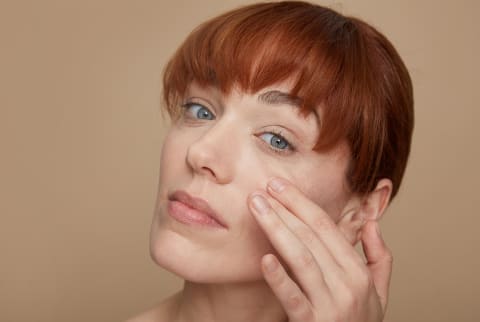Advertisement
This ad is displayed using third party content and we do not control its accessibility features.

Former Senior Beauty & Lifestyle Editor
Former Senior Beauty & Lifestyle Editor
Jamie Schneider is the former Senior Beauty Editor at mindbodygreen. She has a B.A. in Organizational Studies and English from the University of Michigan, and her work has appeared in Coveteur, The Chill Times, and Wyld Skincare.

Image by ohlamour studio / Stocksy
September 23, 2024
We carefully vet all products and services featured on mindbodygreen using our
Our selections are never influenced by the commissions earned from our links.
Beauty fans frequently use food to describe their complexion goals (I’d even argue the beauty space takes cues from the food industry at large, but that’s a story for another day).
Take glazed doughnut skin, for example, which refers to a visage so dewy it glistens—just like icing. Or let’s consider Jello skin, a buzzy term that basically means bouncy, firm skin chock-full of collagen.
But other food items aren’t so acclaimed when it comes to skin care. Case in point? Orange peel skin. It’s a very specific skin texture that’s notoriously difficult to improve—difficult, but not impossible.
If you are serious about firming up your complexion, the best thing you can do lies just below.
What causes orange peel skin?
First, let’s discuss what this skin concern looks like. Think of an orange (or any other citrus fruit) with its slightly dimpled texture—orange peel skin resembles that leathery fruit peel, with visible pores.
“Imagine skin that is thick and shiny with tiny divots in the skin,” says board-certified dermatologist Zenovia Gabriel, M.D., about the colloquial term. “With orange peel skin, the pores appear to be enlarged and dimpled.”
While some people may just have larger pores naturally (pore size is genetic, and they don’t actually shrink), orange peel skin is often a result of collagen decline. “It’s a sign of sun damage and aging. Basically, as collagen and elastin are compromised, the pores are not held closed, leaving them larger and more visible,” says Morgan Rabach, M.D., board-certified dermatologist and co-founder of LM Medical NYC.
That’s why orange peel skin is more common in mature skin, though it can start as early as your 20s (since that’s when your collagen levels start to diminish).
The best thing to do daily
So, what can you do to restore a smooth, plump skin texture? Well, you’ll want to promote collagen production in the skin—and the most effective way to do that is to start from within. And that is where collagen supplements come into play.
Just make sure you’re taking hydrolyzed collagen peptides, as that form is better absorbed by the body (it’s also the form researchers used for those skin-plumping benefits we mentioned above). Bonus points if your supplement also includes extra skin-loving players, like hyaluronic acid and vitamin C; the latter is particularly important, as it promotes collagen production while stabilizing the collagen you already have.
Can you also weave in topical treatments, like retinol, to help stimulate cell turnover? Of course, and you can also opt for AHAs or BHAs to smooth skin texture and make those pores appear smaller. Sunscreen is also crucial to protect orange peel skin from further damage. But if you really want to target diminished collagen levels (which is the cause of orange peel skin in the first place), the most important thing to do is encourage collagen production.
Those with bouncy Jello skin swear by daily collagen supplements for a firmer appearance, too, so it’s a surefire way to transform your skin texture. If you’re looking for a new formula, we highly recommend taking a peek at our list of favorite collagen supplements—each comes vetted and recommended by a nutrition Ph.D. for quality and efficacy.
The takeaway
Let’s review: Orange peel skin can happen for a host of reasons, the biggest one being collagen and elastin loss. That’s why experts encourage promoting collagen however you can, with smart topicals and supplements.
We’re all about addressing skin health from multiple angles, and you really can’t go wrong with this two-pronged approach.
